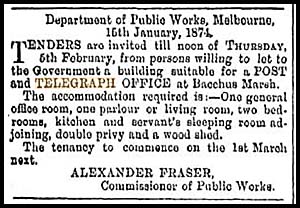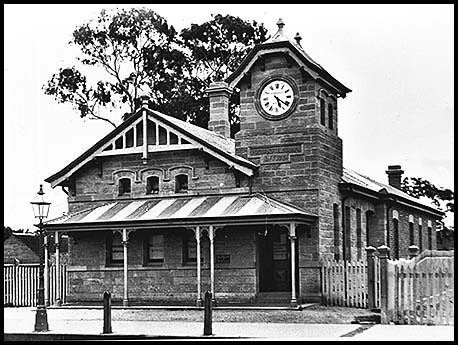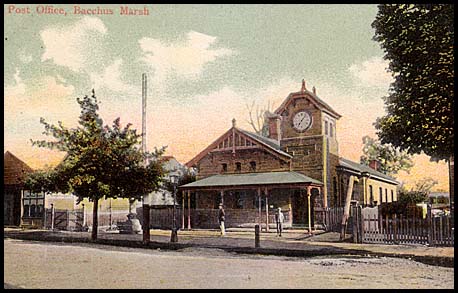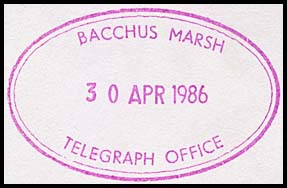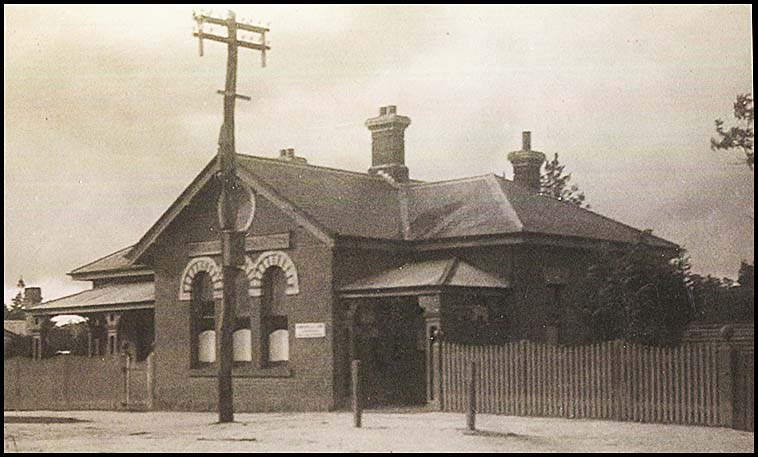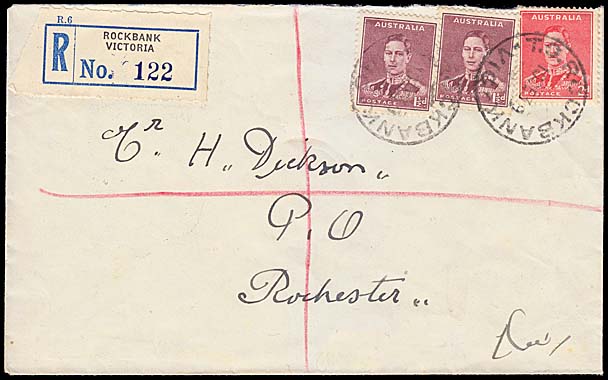Telegraph Offices on the Ballarat line (No. 8 West).
- Australia 1901-1988
- New South Wales
- Queensland
- South Australia
- Tasmania
- Victoria
- Western Australia
- International
- Special aspects
The following Telegraph Offices are included on this page:
| Bacchus Marsh | Ballan | Ballarat East | Blackwood | Buningyong | Gordon |
| Melton | Mount Egerton | Myrniong | Rockbank | Sebastopol |
| Ballan.
The Bacchus Marsh Express of 31 January 1874 reported "The new Telegraph and Post Office at Ballan, erected by Mr. Flack adjoining his present promises, is nearly finished and will present a very good appearance, being two stories in height and built of brick". A delay caused the opening of the Telegraph Office to be delayed until 16 September 1874. The Ballarat Courier of 21 February 1874 had contained details that "Should the telegraph station at Ballan prove a success, after a trial of its collections for six months, a similar office will be established in Gordon; and Miss S.M. Robertson, the respected Post-Mistress (who has been studying telegraphy for some time past), has been promised the appointment of telegraphist". The third Post Office with the name Ballan opened about September 1953. No special date stamp was issued for use with Telegrams. A Telegraph Office was opened at the Railway Station about 1913 and closed about 1917. |
|
The Ballarat Star of 6 June 1877 reported that "the question of additional postal and telegraphic conveniences being given to the residents of Ballarat East has been brought under the notice of the Government and that the Post Office officials here have instructions to extend the delivery of letters and papers to Eureka Humffray and Queen Streets. Seeing that the Town holds some 16,000 inhabitants, the council holds that it deserves a Telegraph Office of its own or, at least, that the delivery of telegrams from the office in the City should not be restricted to within a radius of one mile. Mr John James, M.L.A, has seen the Deputy Postmaster-General on the subject and Mr Turner promised to lay the matter before the Minister without making any promise himself". A further development in the people's quest for a Telegraph Office was reported in the Ballarat Star of 13 January 1879: "We wait with some little anxiety to see what Mr. Patterson, one of the members of the Ministry of promise, will say to the reminder about to be made by the Town Council, with regard to the arrangement of a Telegraph and Money Order Office at the Eastern Library. When last waited upon at his office by a deputation of the Eastern councillors, the Postmaster-General replied to a request made for a Telegraph Office as follows: "Gentlemen, just walk up stairs, take the first door to the right and you will find the permanent head of my department. Tell him from me that he is to arrange what you require and explain what you want. The matter is quite settled; you shall have the office at once". But Ballarat East has not so far been further favored with a look, a word or a line from either Mr Patterson, the Minister or Mr Somebody else "the permanent head of my department”. He is to be reminded of his promise. We can guess his reply —“Put your requisition in writing gentlemen and, as soon as the great pressure of business on the department is disposed of, I will consult my colleagues. You may rest assured that” etc., etc, “And then what?” asks someone. Then the deputation, having thanked the Minister, retired. But what of the Telegraph Office and Minister’s promises? That is a different matter. With regard to the promises, we may add in the words of Professor Baldwin: “Sometimes they'll work, sometimes they won’t” and if this does not prove the competency of the Berry Administration we should like to know what does". On 6 March, the Ballarat Star reported: "A petition is now being handed round for signature in Ballarat East in favor of the proposed Post and Telegraph office being erected in Victoria Street between East Street and King Street, that locality being considered by many to be the most suitable. It is intended to present the petition to the Town Council on Friday night and a large number of signatures have already been affixed to it". The Telegraph Office opened in July 1879. A Telegraph Office opened at the Railway Station about 1910 but was re-classified as a Port Office about 1915 before closing about 1917. |
|
About 1850, there were three very large pastoralist holdings in the Blackwood area. Then in the mid 1850s, gold was discovered (accidentally and while looking for bullocks). In 1873, it was agreed that there were really three townships in the place - Red Hill, Barry's Reef, Golden Point (where gold was first found) and Simmon's Reef. The considerations of selecting the site for the Post and Telegraph Office at Blackwood are discussed elsewhere with Red Hill being the preferred location. At last came a response from those "higher-up" : "A letter has been received from the Postmaster-General stating that the Inspector sent up by him reports that one telegraph station should be enough for the district, to be placed in the most central position and this, he considers is the township of Red Hill and that this course will be adopted when the Government office shall be established at Blackwood". A Post Office was opened as Mount Blackwood in September 1855 and closed in 1921. A Telegraph Office was opened as Mount Blackwood in August 1875 (and announced in the Gazette on 3 September 1875). In 1876, 991 messages were transmitted for revenue of £55 15s 4d. In 1887, 951 messages were transmitted. An excellent description of the gold diggings and the community in 1873 is accessible elsewhere. That source also indicates that the people were awaiting the approval of "telegraph wires and passable roads". Alas when there are four places in close proximity, community spirit sometimes breaks down. The Bacchus Marsh Express of 19 December 1874 published the following letter to the Editor: "To the Editor of the Express. SIR,--Who is your correspondent himself at Barry's Reef? Does he write that he may live, or live that he may write, or is he:
The other week he gave us a mass of figures in £ sterling said to be taken from mines in his locality, but did not mention that it was pound for pound in nearly every instance. Let him publish calls and dividends so that the outside public may not be made "victims of duplicity". Again, in his reply to accusations of not knowing "facts", " stealthiness" and "flagrant misrepresentations". If he knew facts, why did he (in the petition) state that the population were leaving the Point when it is well known the population has been stationary for the last ten years? If there were no stealthiness, why were the inhabitants of the Point not allowed an opportunity of signing the petition? As to the flagrant misrepresentations, I have evidence of many witnesses that it was to them represented merely as for a telegraph to Blackwood. Had they known it was to disturb the Post Office, they would not have signed it. His assertion that other parts of the district are now of far greater importance than the Point ever was in its palmiest days is another proof of his not knowing facts. There were at one time ten thousand people at and below the Point. Will there ever be a quarter of that at Barry's Reef? Verily your correspondent at Barry's Reef is a new chum, and has much to learn. LEX. |
| Buninyong.
The Post Office opened when the Bunnenyong Office was renamed Buninyong on 17 January 1859. In 1857, Buninyong had been made a gold escort station on the route from Geelong and Meredith to Ballarat. It is located a short distance to the south of Ballarat and is about 2 miles from Magpie. The Telegraph Office opened on 27 October 1862. The Bendigo Advertiser of 23 November 1868 announced that "The Government have removed the letter carrier and telegraph messenger to another district without appointing any one in their place and great inconvenience has been caused in the borough in consequence; and the burgesses are very much chagrined at the treatment they have received". On 17 June 1872, The Herald reported "The Hon. the Treasurer, in answer to Mr. Russell M.L. A., today stated that he would favorably consider a request which had been made by the residents of Buninyong to have new premises erected as a Post and Telegraph office". Tenders were called for the new building on 18 January 1873. The following month, Jenkins Lewis was announced as the successful tenderer for the erection of the Post and Telegraph office, Buninyong with an agreed cost of £1,101 10s. l1d. |
||
|
||
The Telegraph Office used a 1 hole Belt & Buckle date stamp.
|
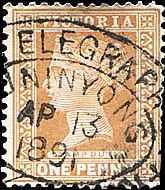 13 April 1891. (earliest recorded date). |
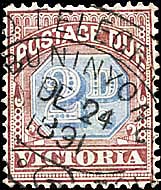 24 December 1891 On a 2d Victoria Postage Due. |
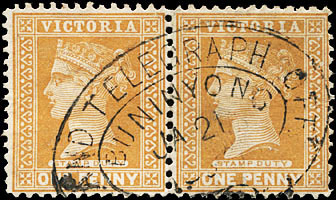 21 January 18??. Most complete strike recorded. |
||
|
The Telegraph Office opened in March 1875. The Ballarat Courier of 21 February 1874 contained the details that "Should the telegraph station at Ballan prove a success, after a trial of its collections for six months, a similar office will be established in Gordon; and Miss S.M. Robertson, the respected Post-Mistress (who has been studying telegraphy for some time past), has been promised the appointment of telegraphist". The Post Office opened on 1 July 1858 as Gordons had changed to Gordon in 1887. No special date stamp was issued for use with Telegrams. A Telegraph Office was opened at the Railway Station about 1910 but was reclassified as a Post Office about 1915 and closed about 1916. |
| Melton.
The Telegraph Office opened in September 1877 in conjunction with the Post Office. Prior to that, the Bacchus Marsh Express of 20 September 1875 noted "The absence of a telegraph office, with the wires running through the midst of the township, is frequently commented upon by strangers visiting the township, and is justly attributed to the lethargy of the inhabitants. There is no doubt but that a telegraph office would prove a benefit and convenience to the neighbourhood and a little agitation would ensure its establishment". On 19 May 1877, the same newspaper reported "In all probability a telegraph office will be established here by the end of the month, as it will be opened as soon as the necessary arrangements are completed. It is a want much felt, and the boon will, I am sure, be appreciated by the business people here and in town". |
||
The Office was issued with a T.O. date stamp which was used in two formats:
|
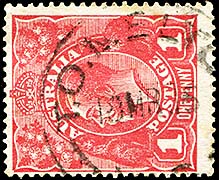 18 March 1915. |
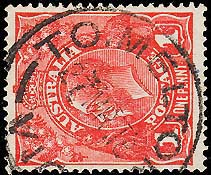 27 March 1918. |
|
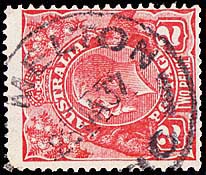 28 January 1937 |
|
|
The Telegraph Office opened in January 1878. A description of Egertonabout one year later is given in the Ballarat Courier of 7 January 1879. |
|
The Telegraph Office opened in February 1876. |
A Public Meeting at Myrniong on 6 July 1874 (reported in the Bacchus Marsh Express of 11 July 1874), summarises the reasons why most towns on the North Western line considered they needed a Telegraph Office as well as gives some background to the general area: MYRNIONG, (FROM OUR OWN CORRESPONDENT.) A Public meeting was held in the Mechanics' Institute on Monday evening last to urge on the Government the necessity of providing this township with the means of telegraphic communication. There was a good attendance, and the meeting evinced considerable anxiety on the subject. Mr. George Granut was voted to the chair. He said the object of the meeting was to ask the Government to give them a telegraph office at Myrniong. He thought that they had more need of an office than either of the two places in the neighbourhood which were about to have telegraph offices for the reason that at each of said places, the inhabitants had the privilege of being able to reply to their letters on the day they received them. He considered they were entitled to an office at Myrniong and hoped they would soon have one. Mr, T. C. Fraser proposed, and Mr. H. Meikle seconded, the following resolution, which was carried unanimously: "That it is the opinion of this meeting that it is most desirable that the Government should grant a telegraph office at Myrniong for the benefit and convenience of the district". In moving the resolution, Mr. Fraser said that he thought the district was as much entitled to a telegraph office as any place on the line. It was the centre of a large pastoral and agricultural district, and it was of the utmost importance to the inhabitants, many of whom paid high rents for their land, that they should have the earliest and latest information possible as to the state of the markets. The State had made and was extending great lines of railway to the remotest corners of the colony, a matter which he was glad to see, but the practical effect of that was that not only were those remote districts in one sense, and that a very important one, nearer the great markets, but even neighbouring colonies were brought within a few hours journey of these markets, The consequence was that farmers, graziers, and others, who paid high for their land, had to compete with the great stock owners of New South Wales, as well as those of our own colony, who paid only low rental for Crown lands, so that the terms on which they met were most unequal, By having a telegraph office here, producers could send down or hold back at the last moment, and thus catch a good market when stock happened to be high, or save their gear from being sacrificed when there was a glut. Again, they were entitled to an office to make up, in some degree, for the disadvantage under which they laboured at present owing to their postal arrangements. Three coaches met at Myrniong daily, except Sunday, and yet they could not answer their letters by the same day's post. The other townships on the line had all the advantages of the time elapsing between the passing and re-passing of the morning and afternoon coaches, to open and reply to their letters, while they had to wait till the next day. Some of the townships had actually two mails a day, and he had several times to send to Bacchus Marsh, involving a ride of about 24 miles, in order to catch an early post for another part of the colony. A telegraph office would go far to remedy this grievance. Another reason for advocating the establishment of an office here was the benefit it would be to the Police Department. The last but not the least weighty reason he would state was that there was no medical man nearer than Ballan or Bacchus Marsh. In a case of emergency it would be a long way to go to either of these places, and perhaps after all not finding the doctor at home. The wire would improve our chances ten to one, for the whereabouts of each doctor could be ascertained in a few minutes. He knew of no more benevolent object for which the wire could be used than that of alleviating pain or saving life, and it was now extensively so used. He trusted the Government would not deal niggardly with them for the matter of a few pounds, when they considered the benefit they would bestow on the district at large. Mr. T. White said he was in favour of a telegraph office here for its numerous advantages, as Mr. Fraser had already stated, and also because it would not be expensive, for the line already passed close to the post office. He hoped he would soon have the pleasure of seeing such a great acquisition to their interests in full working order in Myrniong. Mr. H. Meikle proposed, and Mr. Meehan seconded, and it was carried "That a committee, consisting of Messrs. Fraser, Rowland, White, and the mover, be appointed to draw out a memorial in support of the resolution, and forward the same to the Treasurer for the colony of Victoria.". Mr. Meikle endorsed what had already been said in favour of a telegraph office, and thought the time had arrived when this important addition to their township was really necessary in order to keep pace with the advance of civilization and trusted the most favourable consideration would be given to their request by the Government of Victoria. Other speakers followed, and all testified to the great advantage it would be to be connected and brought within call of the principal parts of the colony. The meeting then terminated. A petition embodying the foregoing resolutions, &c., has been forwarded to the Hon. the Treasurer". |
|
Rockbank.
The Telegraph Office at Rockbank (below Melton) opened about 1914 and closed about 1919. A Post Office had been opened at Rockbank on 1 January 1862. It was closed on 1 July 1996. Rockbank was also an important link in the Beam Wireless operated by AWA. A receiving station was constructed there and, on 8 April 1927, operations commenced to link Australia wirelessly to England and Europe.
|
| The Office was issued with a T.O. date stamp in three different formats for use with telegrams:
|
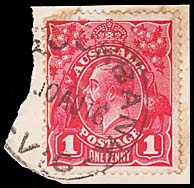 10 August 1916. |
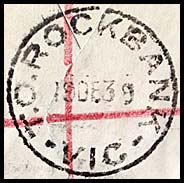 19 December 1939 (on reverse side of the cover below). |
Rockbank T.O./Vic on cover - very rare (better of two recorded examples). |
||
|
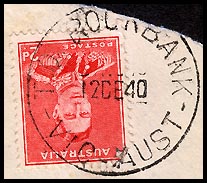 12 December 1940. |
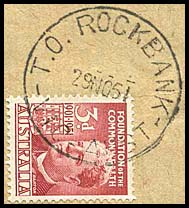 29 November 1951. |
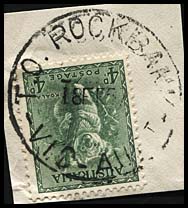 18 February 1957 (LRD). |
||
|
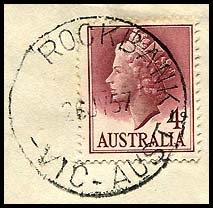 26 July 1957. |
|
|
A telegraph office was opened in January 1870. "Mrs. Landells, the Post and Telegraph Mistress of Sebastopol, has been appointed to the vacancy caused by the death of Mrs. Aspinall. Mrs. Drury, wife of the late Mr. Drury, P.M., has been appointed to the position vacated by Mrs. Landells" (The Age 15 April 1875).
|
